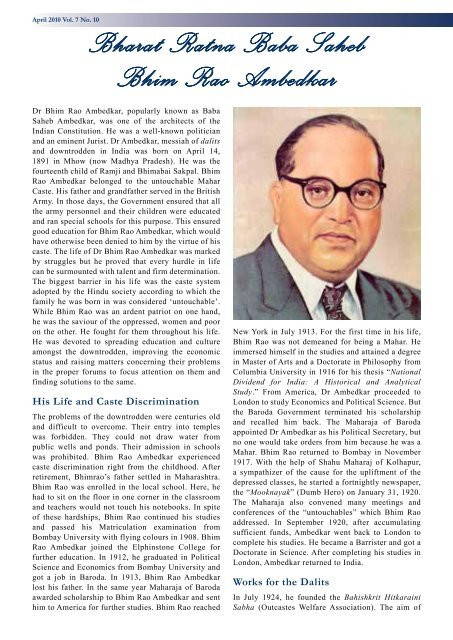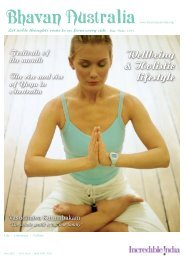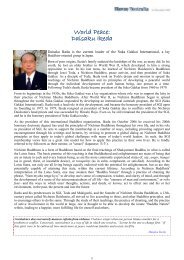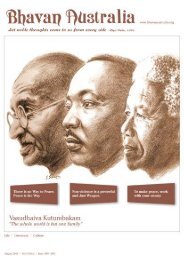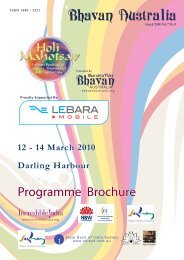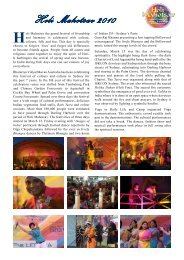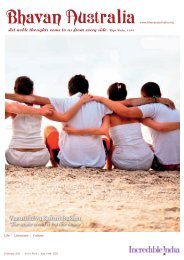'The whole world is but one family' - Bharatiya Vidya Bhavan Australia
'The whole world is but one family' - Bharatiya Vidya Bhavan Australia
'The whole world is but one family' - Bharatiya Vidya Bhavan Australia
You also want an ePaper? Increase the reach of your titles
YUMPU automatically turns print PDFs into web optimized ePapers that Google loves.
April 2010 Vol. 7 No. 10<br />
Bharat Ratna Baba Saheb<br />
Bhim Rao Ambedkar<br />
Dr Bhim Rao Ambedkar, popularly known as Baba<br />
Saheb Ambedkar, was <strong>one</strong> of the architects of the<br />
Indian Constitution. He was a well-known politician<br />
and an eminent Jur<strong>is</strong>t. Dr Ambedkar, messiah of dalits<br />
and downtrodden in India was born on April 14,<br />
1891 in Mhow (now Madhya Pradesh). He was the<br />
fourteenth child of Ramji and Bhimabai Sakpal. Bhim<br />
Rao Ambedkar belonged to the untouchable Mahar<br />
Caste. H<strong>is</strong> father and grandfather served in the Brit<strong>is</strong>h<br />
Army. In those days, the Government ensured that all<br />
the army personnel and their children were educated<br />
and ran special schools for th<strong>is</strong> purpose. Th<strong>is</strong> ensured<br />
good education for Bhim Rao Ambedkar, which would<br />
have otherw<strong>is</strong>e been denied to him by the virtue of h<strong>is</strong><br />
caste. The life of Dr Bhim Rao Ambedkar was marked<br />
by struggles <strong>but</strong> he proved that every hurdle in life<br />
can be surmounted with talent and firm determination.<br />
The biggest barrier in h<strong>is</strong> life was the caste system<br />
adopted by the Hindu society according to which the<br />
family he was born in was considered ‘untouchable’.<br />
While Bhim Rao was an ardent patriot on <strong>one</strong> hand,<br />
he was the saviour of the oppressed, women and poor<br />
on the other. He fought for them throughout h<strong>is</strong> life.<br />
He was devoted to spreading education and culture<br />
amongst the downtrodden, improving the economic<br />
status and ra<strong>is</strong>ing matters concerning their problems<br />
in the proper forums to focus attention on them and<br />
finding solutions to the same.<br />
H<strong>is</strong> Life and Caste D<strong>is</strong>crimination<br />
The problems of the downtrodden were centuries old<br />
and difficult to overcome. Their entry into temples<br />
was forbidden. They could not draw water from<br />
public wells and ponds. Their adm<strong>is</strong>sion in schools<br />
was prohibited. Bhim Rao Ambedkar experienced<br />
caste d<strong>is</strong>crimination right from the childhood. After<br />
retirement, Bhimrao’s father settled in Maharashtra.<br />
Bhim Rao was enrolled in the local school. Here, he<br />
had to sit on the floor in <strong>one</strong> corner in the classroom<br />
and teachers would not touch h<strong>is</strong> notebooks. In spite<br />
of these hardships, Bhim Rao continued h<strong>is</strong> studies<br />
and passed h<strong>is</strong> Matriculation examination from<br />
Bombay University with flying colours in 1908. Bhim<br />
Rao Ambedkar joined the Elphinst<strong>one</strong> College for<br />
further education. In 1912, he graduated in Political<br />
Science and Economics from Bombay University and<br />
got a job in Baroda. In 1913, Bhim Rao Ambedkar<br />
lost h<strong>is</strong> father. In the same year Maharaja of Baroda<br />
awarded scholarship to Bhim Rao Ambedkar and sent<br />
him to America for further studies. Bhim Rao reached<br />
New York in July 1913. For the first time in h<strong>is</strong> life,<br />
Bhim Rao was not demeaned for being a Mahar. He<br />
immersed himself in the studies and attained a degree<br />
in Master of Arts and a Doctorate in Philosophy from<br />
Columbia University in 1916 for h<strong>is</strong> thes<strong>is</strong> “National<br />
Dividend for India: A H<strong>is</strong>torical and Analytical<br />
Study.” From America, Dr Ambedkar proceeded to<br />
London to study Economics and Political Science. But<br />
the Baroda Government terminated h<strong>is</strong> scholarship<br />
and recalled him back. The Maharaja of Baroda<br />
appointed Dr Ambedkar as h<strong>is</strong> Political Secretary, <strong>but</strong><br />
no <strong>one</strong> would take orders from him because he was a<br />
Mahar. Bhim Rao returned to Bombay in November<br />
1917. With the help of Shahu Maharaj of Kolhapur,<br />
a sympathizer of the cause for the upliftment of the<br />
depressed classes, he started a fortnightly newspaper,<br />
the “Mooknayak” (Dumb Hero) on January 31, 1920.<br />
The Maharaja also convened many meetings and<br />
conferences of the “untouchables” which Bhim Rao<br />
addressed. In September 1920, after accumulating<br />
sufficient funds, Ambedkar went back to London to<br />
complete h<strong>is</strong> studies. He became a Barr<strong>is</strong>ter and got a<br />
Doctorate in Science. After completing h<strong>is</strong> studies in<br />
London, Ambedkar returned to India.<br />
Works for the Dalits<br />
In July 1924, he founded the Bah<strong>is</strong>hkrit Hitkaraini<br />
Sabha (Outcastes Welfare Association). The aim of


